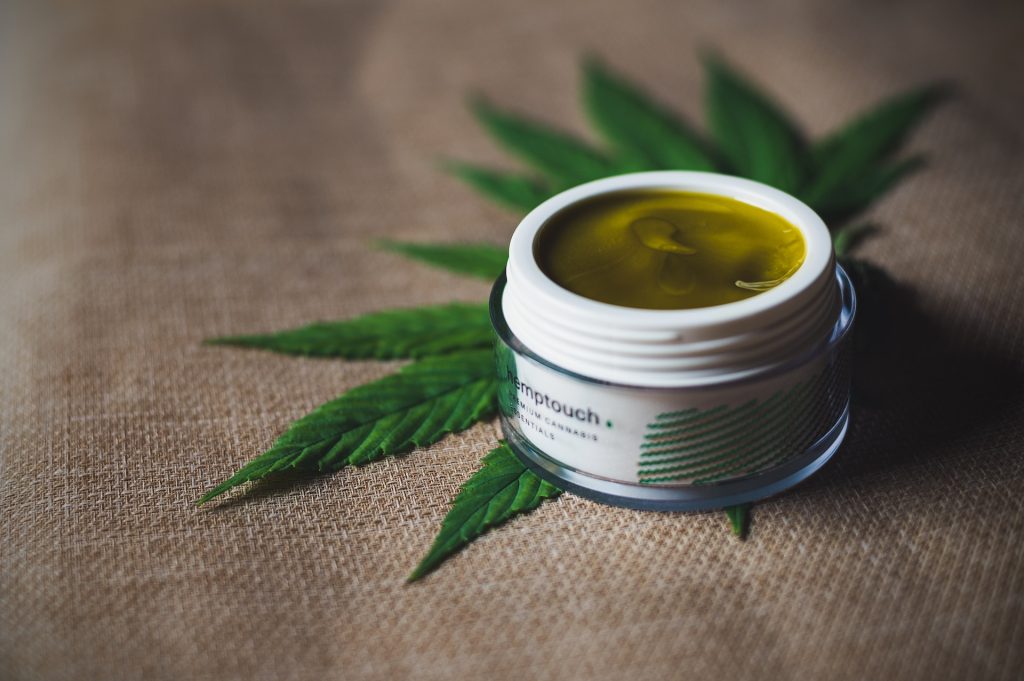A new study published found minor cannabinoids like THCV, CBDV, CBC, CBM, and CBN have therapeutic potential for treating skin conditions such as psoriasis, eczema, and acne. The study shows how cannabinoids interact with the body’s endocannabinoid system to create various pharmacological effects, including anti-inflammatory, pain-relieving, antimicrobial, and even anti-aging benefits.
Cannabinoids for Skin Conditions: Study Reveals Potential Benefits


A new study suggests that lesser-known cannabinoids produced by cannabis—specifically THCV, CBDV, CBC, CBM, and CBN—could potentially help in treating skin diseases like psoriasis, eczema, and acne.
“The results of this study suggest that minor cannabinoids show therapeutic promise in the management of skin diseases,” says the study, published this week in the peer-reviewed journal Molecules. “Incorporating minor cannabinoids into dermatological therapies could offer new treatment options for patients and improve their overall well-being.”
Research Methodology and Key Findings
To arrive at these conclusions, Polish researchers Emilia Kwiecień and Dorota Kowalczuk reviewed existing literature published in scientific journals. They found that minor cannabinoids “exhibit various pharmacological activities, including anti-inflammatory, pain-relieving, antimicrobial, and anti-itch properties.” Some studies “reported their effectiveness in alleviating symptoms associated with skin diseases such as psoriasis, eczema, acne, and itching,” note the authors.
Cannabinoids Targeting Specific Conditions
Certain minor cannabinoids seem especially suitable for treating specific diseases. “CBDV, with its anti-inflammatory properties, can be used to alleviate skin symptoms like itching and swelling in the treatment of atopic dermatitis (AD),” write the authors. This cannabinoid “also possesses anti-inflammatory and antioxidant properties that can potentially heal acne lesions.”
Emerging Cannabinoids in Therapeutic Research
“Other recently discovered cannabinoids, such as CBM and CBE, also demonstrated anti-inflammatory potential,” continues the study. “They offer a new alternative for conducting scientific research on specific diseases. Likewise, CBC, with its anti-inflammatory and antioxidant effects, could have a positive impact on the treatment of acne, psoriasis, and Alzheimer’s disease.”
THCV: A Versatile Cannabinoid
THCV, on the other hand, “shows multiple promising properties in fighting acne,” as it can help regulate sebum production. It “also possesses anti-inflammatory and antibacterial properties that may help relieve inflammation and combat the bacteria responsible for the development of acne.”
In total, the researchers identified possible therapeutic applications for minor cannabinoids, including CBDV (cannabidivarin), CBDP (cannabidiforol), CBC (cannabichromene), THCV (tetrahydrocannabivarine), CBGA (cannabigerolic acid), CBG (cannabigerol), and CBN (cannabinol), as well as more recently discovered cannabinoids CBM (cannabimovone) and CBE (cannabielsoin).
How Cannabinoids Interact with the Body
These effects are attributed to the interaction of cannabinoids with the body’s endocannabinoid system, “a central regulatory system responsible for maintaining health and proper functioning in almost all organisms,” explain the authors of the study. “Increasing evidence suggests that endocannabinoid signaling plays a crucial role in regulating biological processes of the skin. Many skin functions, such as immune response, cellular proliferation, differentiation, and survival, are at least partially regulated by the endocannabinoid system, and suppressing skin inflammation is one of its most important functions.”
Topical applications of minor cannabinoids could even contribute to mitigating the effects of aging, according to the study.
Remaining Challenges and Future Research
The authors emphasize that additional research is required on minor cannabinoids “to confirm their effectiveness and safety.” They acknowledge existing hurdles to progress. “The impact on the nervous system, issues related to the quality and regulation of products, as well as ethical and legal aspects, including legality, require thorough examination,” they write. “Therefore, despite the promising therapeutic prospects, the use of cannabinoids, particularly minor cannabinoids, requires further research, regulations, and a balanced approach to ensure the benefits while minimizing potential health and societal risks.”
—
(Featured image by CBD Infos via Unsplash)
DISCLAIMER: This article was written by a third-party contributor and does not reflect the opinion of Hemp.im, its management, staff, or its associates. Please review our disclaimer for more information.
This article may include forward-looking statements. These forward-looking statements generally are identified by the words “believe,” “project,” “estimate,” “become,” “plan,” “will,” and similar expressions. These forward-looking statements involve known and unknown risks as well as uncertainties, including those discussed in the following cautionary statements and elsewhere in this article and on this site. Although the company may believe that its expectations are based on reasonable assumptions, the actual results that the company may achieve may differ materially from any forward-looking statements, which reflect the opinions of the management of the company only as of the date hereof. Additionally, please make sure to read these important disclosures.
First published in Newsweed, a third-party contributor translated and adapted the article from the original. In case of discrepancy, the original will prevail.
Although we made reasonable efforts to provide accurate translations, some parts may be incorrect. Hemp.im assumes no responsibility for errors, omissions or ambiguities in the translations provided on this website. Any person or entity relying on translated content does so at their own risk. Hemp.im is not responsible for losses caused by such reliance on the accuracy or reliability of translated information. If you wish to report an error or inaccuracy in the translation, we encourage you to contact us.



Comments are closed for this post.